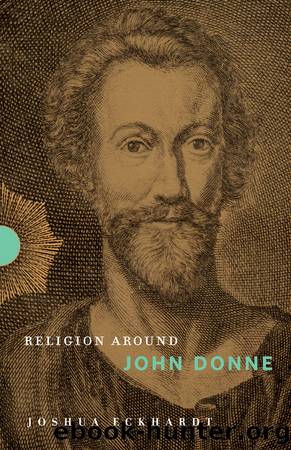Religion Around John Donne by Eckhardt Joshua;

Author:Eckhardt, Joshua;
Language: eng
Format: epub
Publisher: Pennsylvania State University Press
these
If on thâse things I durst not look, durst I
vpon his miserable mother cast my eye;
whoe was Gods partner here, & furnisht thus
half of that Sacrifice wch ransomd vs19
Readers in the Church of England may not have had any reason to disagree with the claim that Mary provided the human âhalfâ of the âSacrificeâ that âransomd vs.â But following a politicized endorsement of the immaculate conception, it could make them suspect that they were reading the work of a Catholic inclined to elevate Maryâs role in salvationâor at least of a convert to the national church who had written the poem before relinquishing his Catholicism.
Each of these four consecutive poems features the Virgin Mary. Whether by accident or by design, they combine to present Donne as affirming not only her intercessory role but also her immaculate conception. They show Donne endorsing not only her post-Reformation but also her Counter-Reformation role. And they show him reproaching the virgin queen for daring to occlude the Blessed Virgin. If Donne has ever looked to anyone like a resistant Catholic, he did in this manuscript. Indeed, in certain parts of the Bridgewater manuscript, Donne looks like Mirreus. Donne mocked Mirreusâs Catholicism in his satires earlier in the volume. But he mocked everyone elseâs religious views in the poem too, without settling on any religious position. With the Bridgewater manuscript opened to its presentation of his religious poems, Donne appears to have embraced that Catholicism, without shrinking from its political implications.
Even though they rank as particularly early collectors of Donneâs works, who knew him personally, the Countess of Bridgewater and her family could easily have entertained the possibility that Donne had written Catholic verses during Elizabethâs reign. After all, Donne had lost his service position with the countessâs father-in-law, Sir Thomas Egerton, during that time, partly because of his Catholic background. Donne eloped with Egertonâs niece, Anne More, so his new father-in-law, Sir George More, persuaded Egerton to dismiss him and jail him. Sir George must have refused to support the match, at least partly, because of Donneâs âsocial and economic status.â As Steven May has pointed out, âthe husbands of Anneâs four sisters were (or became) knights.â20 But Moreâs refusal also had to do with religion. Donne began the process of informing More of the wedding by sending a letter via Henry Percy, ninth Earl of Northumberland. The earl, of course, did not want for âsocial and economic status.â Yet, in Dennis Flynnâs words, Northumberland âwas a scion of executed Catholic traitors (as such regarded with suspicion by all who, like More, were fervent supporters of Tudor government and the established religion).â21 Northumberland thus emphasized Donneâs Catholic connections at just the time that Donne lost his professional connection to Egerton. Egertonâs descendants therefore could have recalled or recounted Donne as a Catholic, and perhaps even an audacious one. They therefore could have found it easy to imagine this Church of England divine once writing a sonnet that endorses an exclusively Catholic belief and reproaches the queen of England.
Download
This site does not store any files on its server. We only index and link to content provided by other sites. Please contact the content providers to delete copyright contents if any and email us, we'll remove relevant links or contents immediately.
What Is the Gospel? (Foreword by D. A. Carson) by Greg Gilbert(953)
Daily Strength: Devotions for Bible Believing Study by Douglas Stauffer & Andrew Ray & Rick Quatro(856)
Christian Ethics by Wilkens Steve;(767)
The Practice Is the Path by Tias Little(759)
New Morning Mercies by Tripp Paul David(756)
Jesus in Me by Anne Graham Lotz(722)
Veritas: A Harvard Professor, a Con Man and the Gospel of Jesus's Wife by Ariel Sabar(694)
Cleaning Up Your Mental Mess by Dr. Caroline Leaf(676)
Greatest Mystery in the World by Og Mandino(608)
The Creative Call by Janice Elsheimer(532)
No More Christian Nice Guy by Paul Coughlin(529)
Our Appointment with Life by Thich Nhat Hanh(528)
2084 by John C. Lennox(511)
Monastic Archaeology by Unknown(496)
This One Wild and Precious Life by Sarah Wilson(496)
Jesus--Awesome Power, Awesome Love (Discover 4 Yourself® Inductive Bible Studies for Kids) by Kay Arthur(494)
The Duties of Parents by J.C. Ryle(471)
The Tale of the Tardy Oxcart (Swindoll Leadership Library) by Swindoll Charles R(447)
A Closer Talk with God: Scriptural Prayers for Women by Kim Trujillo(436)
